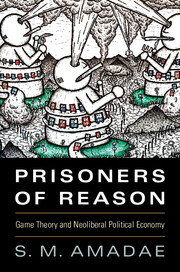4 - Deterrence
from PART I - WAR
Published online by Cambridge University Press: 18 December 2015
Summary
Rational deterrence is a highly influential social science theory. Not only has it dominated postwar academic thinking on strategic affairs, but it has provided the intellectual framework of Western military policy in the same period as well. The theory's success drives largely from its clearheaded logic, which is as persuasive as it is elegant.
The power of rational deterrence theory is conceptual, not mathematical. It derives from the underlying logical cohesion and consistency with a set of simple first principles, not from the particular language in which it is expressed. In consequence, the model has been astonishingly fecund, both for theory and policy.
No other theoretical perspective has had nearly the impact on American foreign policy … Far from being an abstract, deductivistic theory developed in a policy vacuum, rational deterrence theory has repeatedly taken inspiration from the most pressing policy questions of the day, from decision of bomber-basing in the 1950s to SDI [Strategic Defense Initiative] in the 1980s. It has set the terms of the debate, and has often influenced the outcome.
Christopher Achen and Duncan Snidal, 1989So far we have seen that strategic rationality, which endorses the logic of consequences, accepts an underlying philosophical realism about value in the form of interpersonally transferable utility, and rejects joint maximization, seemed tailor-made to address the as yet counterfactual hecatomb of waging nuclear war. Thomas Schelling had sought to defend mutual assured destruction (MAD), reminiscent of reciprocal security under classical liberalism, by modeling a high-stakes nuclear security standoff with the recalcitrant Prisoner's Dilemma game. Given the existential reality of assured destruction in a nuclear war among superpowers, and the shared goal of avoiding Armageddon, by all counts MAD should have won the theoretical security debate and prevailed over US nuclear strategy.
Yet, with hindsight, observers may now be tempted to conclude both that the nuclear security debate vindicated nuclear utilization targeting selection (NUTS) theoretically and helped the United States win the Cold War in practice. Readers may thus wonder, “Why revisit the nuclear security debate, especially given the successful denouement of the superpower standoff?” The choice of adopting orthodox game theory as the exhaustive statement of coherent action necessarily pronounces escalation dominance logically superior to reciprocal deterrence, despite the fact that maintaining nuclear ascendance over another superpower is impossible.
- Type
- Chapter
- Information
- Prisoners of ReasonGame Theory and Neoliberal Political Economy, pp. 99 - 140Publisher: Cambridge University PressPrint publication year: 2016



